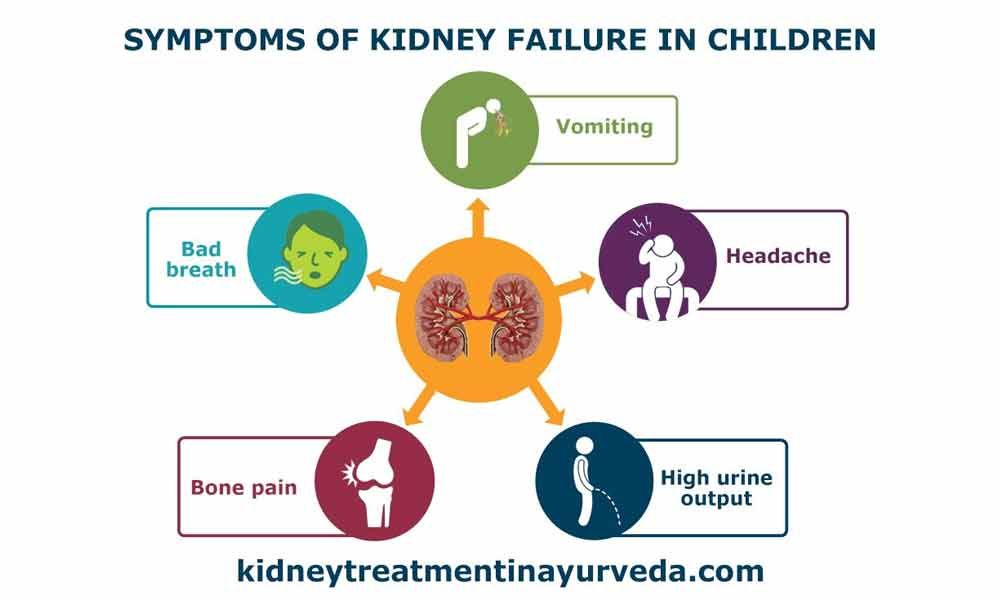Live
- Lankan President launches 'Clean Sri Lanka' initiative to heal environment and society
- Pushpa 2 Box Office Collection Day 27: Allu Arjun & Rashmika Mandanna's Film Crosses Rs 1000 Crore Worldwide
- Chess rankings: Erigaisi 4th, Gukesh 5th as nine Indians ranked in top-50 in Open section
- Hyderabad to Get Extended Metro Rail: CM Approves Expansion to Medchal and Shamirpet
- Punjab Vigilance Bureau held 173 on bribery charge in 2024: Top official
- New Orleans Truck Rams Into Crowd, 10 Killed and 30 Injured in Deadly Incident
- Haryana CM hails farmer-friendly decisions by first Union Cabinet of 2025
- Himachal Institute of Public Administration renamed after late former PM Manmohan Singh
- Garena Free Fire Max Redeem Codes for January 1, 2025: Unlock Free Rewards and Exciting Prizes
- Time to prioritise technology, talent to determine our long-term success: Gautam Adani on New Year
Just In
Parents have key role in saving children's kidneys


Only a minority of the world’s population ever thinks of their child’s health.
Hyderabad: Only a minority of the world's population ever thinks of their child's health. Not much importance is given to kidney disorders, as it is still under the radar.
When focusing on a kid's health, many of us, parents, dieticians and pediatricians have a propensity towards obesity and heart related diseases.
Kidney functioning is so vital to maintain a healthy body, it is important for parents to keep an eye on their child's kidney while feeding and raising.
So, this becomes important to create awareness about kidney diseases kids are prone to, that may affect a millions around the globe, including small children, who may be under a risk of kidney disorder/disease at an early age.
Function of kidneys
It is necessary to understand the function and role of kidney to sustain a healthy living.
Kidneys filter out the extra water and wastes from the blood, which leaves the body as urine. Kidney secretes hormones that help in the making of blood and to strengthen the bones.
When the kidneys are affected, they become inefficient in eliminating wastes out of the body, which in turn, increases the rate of heart disease, progressing to renal failure.
Role of parents
It is, therefore, important to educate parents about the importance of renal diseases in children.
Early detection is a must for a healthy lifestyle in children, right from the birth till the old age, in order to combat with the preventable kidney damage, including acute kidney injuries, chronic diseases and kidney disorders a child is born with.
A mother has a vital role to play throughout during her pregnancy phase. A healthy mother delivers a healthy child with a healthy set of nephrons. Probability of bearing a healthy child gets reduced in a mal-nutritious mother.
Thus, a pregnant woman has to be well taken care of as the embryo needs a rich diet of protein, iron and vitamins. Nothing can be done to the kids born with genetic disease.
Premature delivery or a baby with high blood pressure or diabetes is at a higher risk of kidney disorders or heart diseases.
Precautions & tips
Incidences of kidney disease in India are increasing at an alarming rate. According to a recent study, 17 out of every 100 Indians are suffering from kidney diseases.
Parents can do a several things in order to keep their child healthy and to protect their kidneys:
Healthy diet: Parents should keep their children fit, active and eating well to ensure that they do not become overweight.
As a start, children should be encouraged to take part in school sports, and families should become more active.
A balanced diet contains a mixture of fats, carbohydrates and proteins. Avoid processed food and fizzy drinks in order to maintain sugar and salt level
Fluid intake: Intake of healthy fluids is necessary for children, especially water.
But, if children are dehydrated, they should not urinate more frequently, as the water gets absorbed by the body.
No-smoking: Children should be dissuaded from smoking.
Medicines & drugs: Aspirin and other banned drug usages may directly affect the kidney or liver. It dehydrates the body and leads to kidney failure.
Slash sodium: Too much of sodium can lead to hypertension, so cutting down on salt intake is better. Daily 1.5 to 2.3 grams is the prescribed amount of salt intake.
Pump up Potassium – Potassium helps in balancing the water level and in reducing the effect of sodium, thereby reducing blood pressure.
So, it is a key that children are nourished with potassium-rich food (potato, spinach, beans and low-fat dairy products)
Symptoms in children
Here are some indications that can alert the parents
• Difficulty in gaining weight for the child and poor growth
• Frequent body aches, urination or taking longer time to urinate.
• Swollen face, legs, ankles while getting up in the morning
• Change in urine colour
• Recurrent abdomen pain
• Appearance of ants at the urinated area.
(The author is a Nephrologist at Narayana Super Specialty Hospital in Gurugram, Haryana)

© 2024 Hyderabad Media House Limited/The Hans India. All rights reserved. Powered by hocalwire.com






